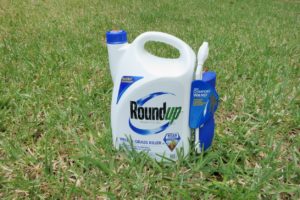New study finds Roundup weed killer linked to premature and underweight infants

Increasing use of herbicides exposing more women and children to harmful pesticides throughout the Midwest
A new project of the Children’s Environmental Health Network (CEHN) highlights growing concern over sharply rising herbicide use and risks to pregnant women and children living in the rural Midwest. A study of pregnant women in an Indiana obstetric practice found glyphosate, the main ingredient in Monsanto’s Roundup herbicide, in the urine of more than 90 percent of test subjects.
The findings are disturbing says lead scientist Dr. Paul Winchester. “In our study, which is ongoing, mothers with relatively higher levels of glyphosate were more likely to have shorter pregnancies and deliver babies with lower birth-weight, outcomes that everyone should be concerned about. Shorter pregnancies with relatively lower birth weights have been linked to lower cognitive ability later in life and higher risk of metabolic syndrome.”
Dr. Winchester will present his findings at the biennial 2017 Children’s Environmental Health Translational Research Conference sponsored by CEHN on April 5.
In a panel titled “Will Rising Herbicide Use in the Midwest Raise Reproductive Risks?” Dr. Winchester and other researchers will present new evidence showing that most Americans are now exposed on a near-daily basis to herbicides widely used on corn and soybean fields. This is because of recent changes in when and how herbicides are applied.
There are mounting concerns over the safety of glyphosate. In 2015, the World Health Organization’s International Agency for Research on Cancer classified glyphosate as a probable human carcinogen. The state of California recently designated glyphosate as a known human carcinogen. Monsanto is facing hundreds of lawsuits from people claiming its weedkiller caused cancer. Recently unsealed court documents also found collusion between Monsanto and the U.S. Environmental Protection Agency in trying to manipulate the science around glyphosate.
Weed resistance leading to “chemical assault” in Midwest
An estimated 300 million pounds of glyphosate are used each year in the U.S. In recent years, an increasing number of weeds have developed resistance to glyphosate, which is leading to even more herbicide use, particularly in the Midwestern U.S. Ten years ago, most soybean fields were sprayed with one or two herbicides. Four or more herbicides will be applied by most soybean growers in 2017, and some of these herbicides will be sprayed more than once.
According to Charles Benbrook of Benbrook Consulting Services, an estimated 120 million acres of cropland will be affected with one or more glyphosate resistant weeds this year. “It’s about time people start talking a bit more accurately about the extent of this glyphosate resistant weed problem and the chemical assault being triggered by it,” says Benbrook who has conducted extensive research about pesticide use in the U.S.
Herbicide use is likely to continue rising for several years, because the Environmental Protection Agency has recently approved several crops genetically engineered to resist (i.e. survive) applications of multiple herbicides. These next-generation GE crops are designed to increase reliance on, and use of specific herbicides.
Around 40 million acres of corn and soybeans will be planted in 2017 to new GE corn and soybean varieties, acres that will be sprayed with combinations of glyphosate, glufosinate (Liberty), 2,4-D (EnlistDuo), dicamba (XtendiMax and Engenia), and several other herbicides.
Dicamba and 2,4-D, which was an ingredient in the notorious defoliant Agent Orange, are known to drift for many miles and harm other crops. In 2016, farmers in several Midwest and Southern states illegally used older formulations of dicamba on Monsanto’s dicamba-resistant GM soybeans and cotton. This caused drift damage to tens of thousands of acres of fruits, vegetables, and other crops.
Rates of application are also rising sharply for some herbicides. Overall soybean herbicide use will, on average, more than double in 2017 compared to 2001.
Herbicides will also be used over a longer time period. “Until this year, most herbicides in the Midwest were sprayed during a six-week window, but now the heavy herbicide spray season will last at least four months, placing more women and children at heightened risk,” said science team member Dr. Phil Landrigan, Dean for Global Health at Mt. Sinai Medical School.
As a result, the risk of reproductive problems and adverse birth outcomes will rise among women and children living in rural areas, according to the panelists.
The CEHN conference will also feature the launch of the Healthy Kids Project, which offers extensive information on trends in herbicide use, the role of glyphosate-resistant weeds in driving herbicide use upward, health risks, and public and private sector actions needed to prevent an increase in adverse birth outcomes in the years ahead.




